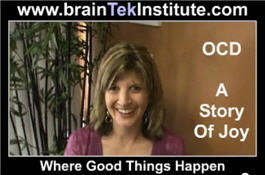Obsessive-Compulsive Disorder (OCD)
According to the 2005 National Comorbidity Survey-Replication study, about 2.2 million American adults have obsessive-compulsive disorder (OCD), a brain disorder that often begins in childhood. The persistent, unwanted thoughts and rituals of OCD sometimes take over people’s lives to the point that they can’t work or maintain relationships or engage in everyday tasks and social interactions.
YESTERDAY : The standard treatment for OCD was a type of long-term psychotherapy aimed at overcoming psychological defenses. There was no evidence that this treatment was effective.Clinicians lacked objective measurements that could help them accurately diagnose OCD – a crucial prerequisite for appropriate treatment. There were no proven medications for OCD. OCD was thought of primarily as a psychoanalytic issue, not a brain disorder.
TODAY: BrainTek offers hope to famlies with effective assessments and protocols. Learn more about BrainTek's methods by
For the family, life can be difficult and exhausting. OCD affects the entire family often causing excess anxiety, stress and depression for other family members. For the person suffering with OCD, they feel just as down. They are aware of their rituals and compulsions, they are aware of the irrational behavior but feel unable to control it.
This teen's doctor, school and friends noticed the drastic change. His mother tells the story.
Questions? or to Schedule your appointment today call BrainTek: 858-222-9138
 |










